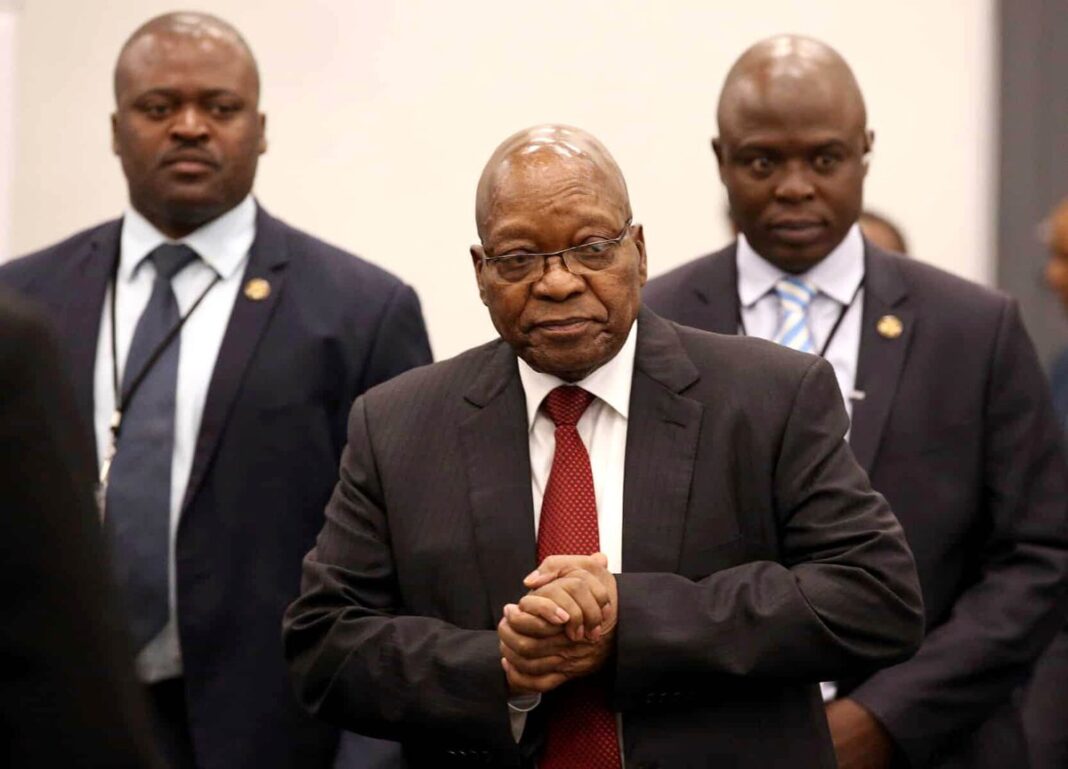CHARLES MOLELE|
SCENES of high drama unfolded in Nkandla, KwaZulu-Natal, when former president Jacob Zuma handed himself over to prison in what some media personalities dubbed ‘The Night of Long Lives’.
Although he was not handcuffed, Police Ministry’s spokesperson Lirandzu Themba confirmed that Zuma was indeed arrested, charged, briefed about his rights and then allocated a cell at the local state-of-the-art correctional centre in Estcourt, KwaZulu-Natal, in compliance with the Constitutional Court judgment.
Zuma will begin his 15-month jail term proper on Thursday at the R387-million, state-of-the-art Estcourt correctional centre opened by government in 2019.
The prison consists of two units, with a capacity to accommodate 512 inmates.
It also has a hospital section, training centre, maintenance workshop, logistics and other support structures.
The dramatic arrest of Zuma, a former head of intelligence for the outlawed African National Congress (ANC) during apartheid, took place against a backdrop of a week of impassioned speeches and threats of ‘Civil War’, with his supporters brandishing weapons and firing guns in the air.
On Tuesday, Zuma took to the Pietermaritzburg High Court in KwaZulu-Natal to stay the arrest.
But a lawyer representing the commission of inquiry of state capture argued a high court does not have jurisdiction to interfere in matters of the Constitutional Court.
He will again turn to the Constitutional Court next week Monday in a bid to rescind its judgment against him.
Zuma has strongly denied any wrongdoing, saying he was a victim of political persecution and abuse of state organs by the administration of President Cyril Ramaphosa.
The Jacob Zuma Foundation spokesperson, Mzwanele Manyi, said the detention of Zuma without trial was a travesty of justice and an indictment of the country’s constitutional order.
“To have a 79-year-old in 2021 detained without trial in a constitutional democracy is scandalous. To have one of the freedom fighters of this country under the ANC government that is incarcerated for 15 months not for killing anyone, but purely because he wanted justice, he wanted neutrality, he wanted fairness. And now tonight he’s sleeping in some cold place,” Manyi lamented.
“He is 79-year-old! How cruel can people get? We should be ashamed of ourselves in this country. We should be ashamed that the constitution that people fought for is now being used in a manner that incarcerates innocent people without a fair trial.”
However, Zuma’s conviction and jailing provides a powerful example to other African states of holding their rulers to account.
In 2016, the Public Protector Thuli Madonsela recommended the establishment of a commission to consider allegations of corruption by the Zuma presidency.
With no choice, Zuma established the Commission of Inquiry into Allegations of State Capture, headed by Deputy Chief Justice Raymond Zondo.
But Zuma has persistently stonewalled the work of the commission and refused to appear before it, even when the court ordered him to do so.
Zuma, whose Zulu middle name, Gedleyihlekisa, means “the one who smiles as he hurts you”, joined the ANC in 1959.
The son of a policeman and domestic worker from what is now rural KwaZulu Natal, he had little formal education.
After 10 years on Robben Island alongside Nelson Mandela, he fled apartheid South Africa to emerge in the late 1980s in the Zambian capital, Lusaka, as deputy head of the ANC’s secret police and head of the ‘Green House’, its intelligence unit.
One of his main tasks was to unmask informants and traitors within the ANC and MK, wielding the resources of the ANC secret police, known as iMbokodo or “The Grindstone”.
The Stuart Commission, an internal ANC inquiry into unrest in 1983 in guerrilla camps in Angola, described iMbokodo as “the most notorious and infamous department in the camps and perhaps in the whole movement”.
The report, available on the ANC’s website, painted a picture of the ANC security services as a state-within-a-state, feeding off rumor and “not working for the security of the general membership and interests of the movement”.
According to historian Stephen Ellis in his 2012 book, “External Mission: The ANC in Exile 1960-1990”, Zuma’s time in Lusaka shaped the rest of his life.
“For the remainder of his political career, this experience in charge of intelligence was to be Zuma’s key institutional base,” Ellis wrote.
- Inside Politics



